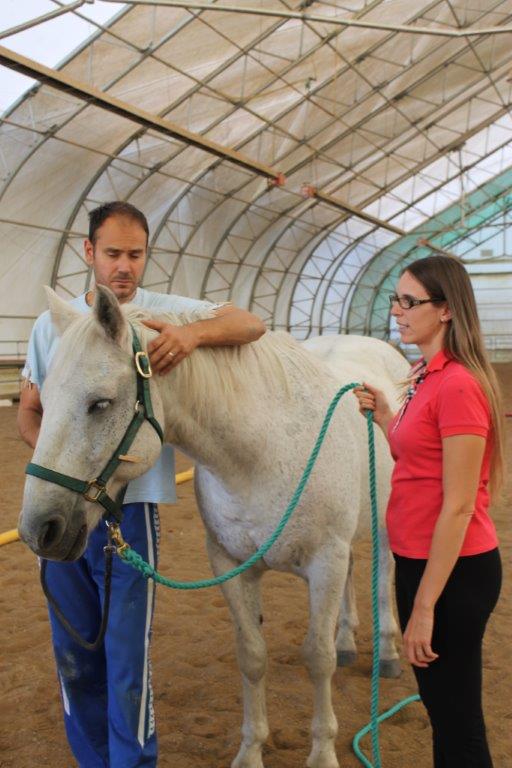Research Studies

A helping hoof can do wonders for people receiving treatment for mental health and addictions issues, researchers have found.
"Unlike people, animals don’t judge", noted Colleen Dell, research chair in One Health and Wellness at the University of Saskatchewan.
“If you think of that in addictions and mental health, in particular for addictions, there’s so much stigma. People have been judged or they feel that they’re being judged, and when they’re with that animal, they’re not — and that can be profound for somebody, to experience that unconditional love.”
Dell and Darlene Chalmers of the University of Regina have found that people who participated in mental health and addictions treatment programs involving interactions with horses reported therapeutic benefits in their healing.
They followed 60 clients through 287 encounters in programs at four addiction and mental health treatment sites in Saskatchewan.
They all had results in common — contact with horses made people feel open, happy and less stressed, Dell said.
“You have to be very calm to get that horse to do anything with you, and to even engage with you,” she said.
Not only did participants feel better, staff at their treatment facilities reported their clients were more engaged and happy, and more prepared to address difficult issues.
A direct causal link between horse therapy and improved addictions outcomes isn’t yet proven, so Dell hopes to do a randomized control trial.
“But we can say without doubt that the animal added to the therapeutic benefit of what was happening,” she said.
"Unlike people, animals don’t judge", noted Colleen Dell, research chair in One Health and Wellness at the University of Saskatchewan.
“If you think of that in addictions and mental health, in particular for addictions, there’s so much stigma. People have been judged or they feel that they’re being judged, and when they’re with that animal, they’re not — and that can be profound for somebody, to experience that unconditional love.”
Dell and Darlene Chalmers of the University of Regina have found that people who participated in mental health and addictions treatment programs involving interactions with horses reported therapeutic benefits in their healing.
They followed 60 clients through 287 encounters in programs at four addiction and mental health treatment sites in Saskatchewan.
They all had results in common — contact with horses made people feel open, happy and less stressed, Dell said.
“You have to be very calm to get that horse to do anything with you, and to even engage with you,” she said.
Not only did participants feel better, staff at their treatment facilities reported their clients were more engaged and happy, and more prepared to address difficult issues.
A direct causal link between horse therapy and improved addictions outcomes isn’t yet proven, so Dell hopes to do a randomized control trial.
“But we can say without doubt that the animal added to the therapeutic benefit of what was happening,” she said.
|
The Helping Horse
June 2013 How Equine Assisted Learning Contributes to the Well-being of First Nations Youth in the Treatment of Volatile Substance Misuse. Research was done at Cartier Farms Equine Assisted Learning
(click Button to view or download) |
|
Pilot Study
November 2016 This Empirical fact sheet shares the history and findings of a pilot study of the Cartier Farms Equine Assisted Learning Building Block Program with teh clients from the White Buffalo Youth Inhalant Treatment Centre. this study emphasized the importance of animal assisted intervention (AAI) when used in conjunction with the conventional modalities to assist in treatment of mental health issues.
(click Button to view or download) |
|
McMasters University Examining the effectiveness of Equine Assisted Learning for trauma-exposed public safety personnel
2023 - Ongoing Study The purpose of this study is to evaluate a possible treatment for improving symptoms associated with
trauma among public safety personnel (PSP; e.g., police officers, fire fighters, paramedics, emergency dispatchers, correctional workers, healthcare workers). This is an ongoing study that is currently happening. (click Button to view or download) |